Organisational Behaviour: Culture, Politics & Motivation at Plan.com
VerifiedAdded on 2023/01/11
|13
|3720
|54
Report
AI Summary
This report provides an analysis of organisational behaviour, focusing on the impact of organisational culture, politics, and power on individual and team behaviour, as well as performance, with specific reference to Plan.com. It discusses process and content theories of motivation, including Adams' equity theory and Maslow's hierarchy of needs, highlighting their advantages and disadvantages. The report also compares effective and ineffective teams and briefly discusses the philosophies and concepts of organisational behaviour, emphasising the importance of understanding these concepts for effective decision-making and positive employee-employer relationships. The analysis covers the importance of motivation and its impact on productivity and progress, suggesting that both process and content theories should be prioritised by every organisation.
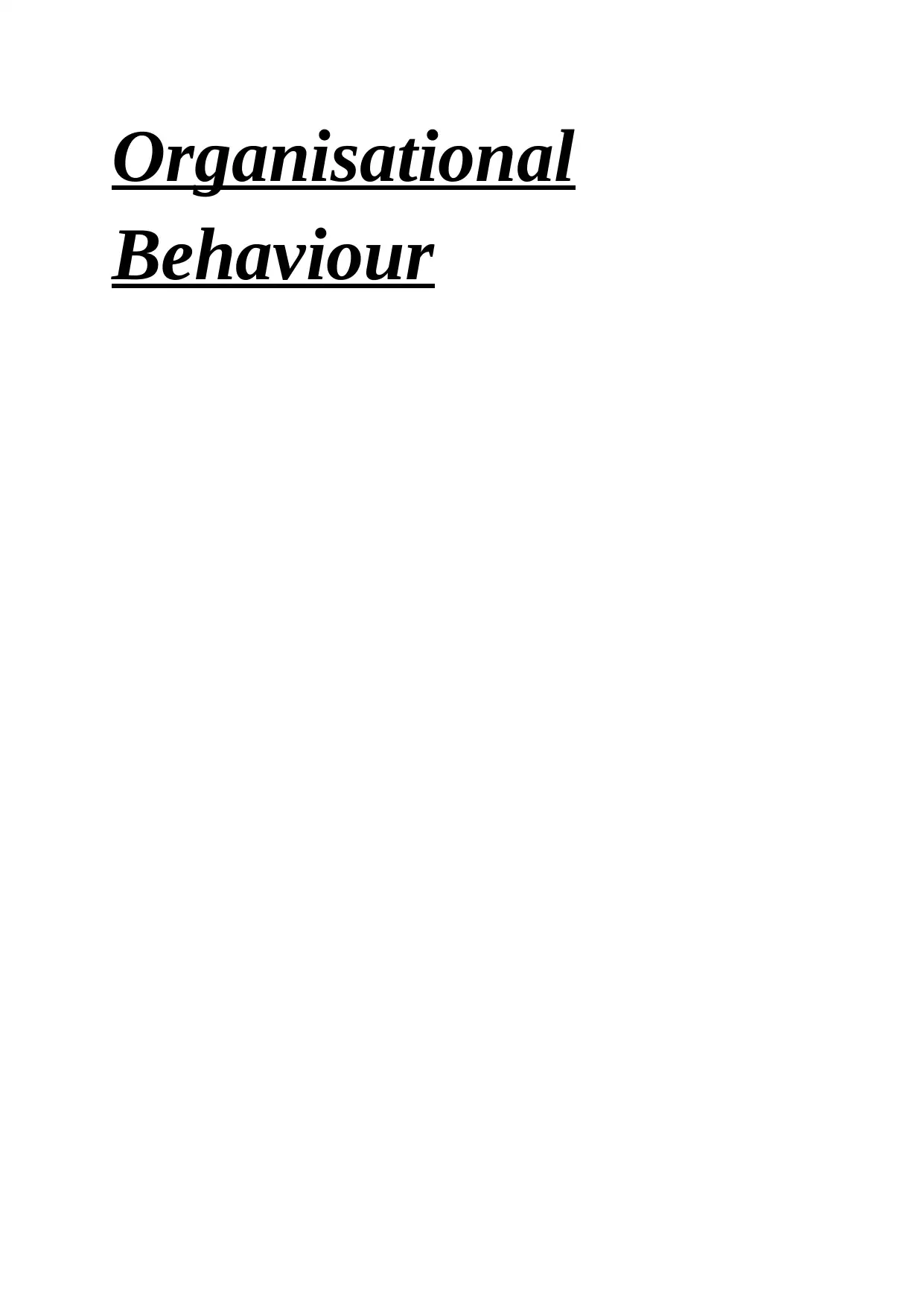
Organisational
Behaviour
Behaviour
Paraphrase This Document
Need a fresh take? Get an instant paraphrase of this document with our AI Paraphraser
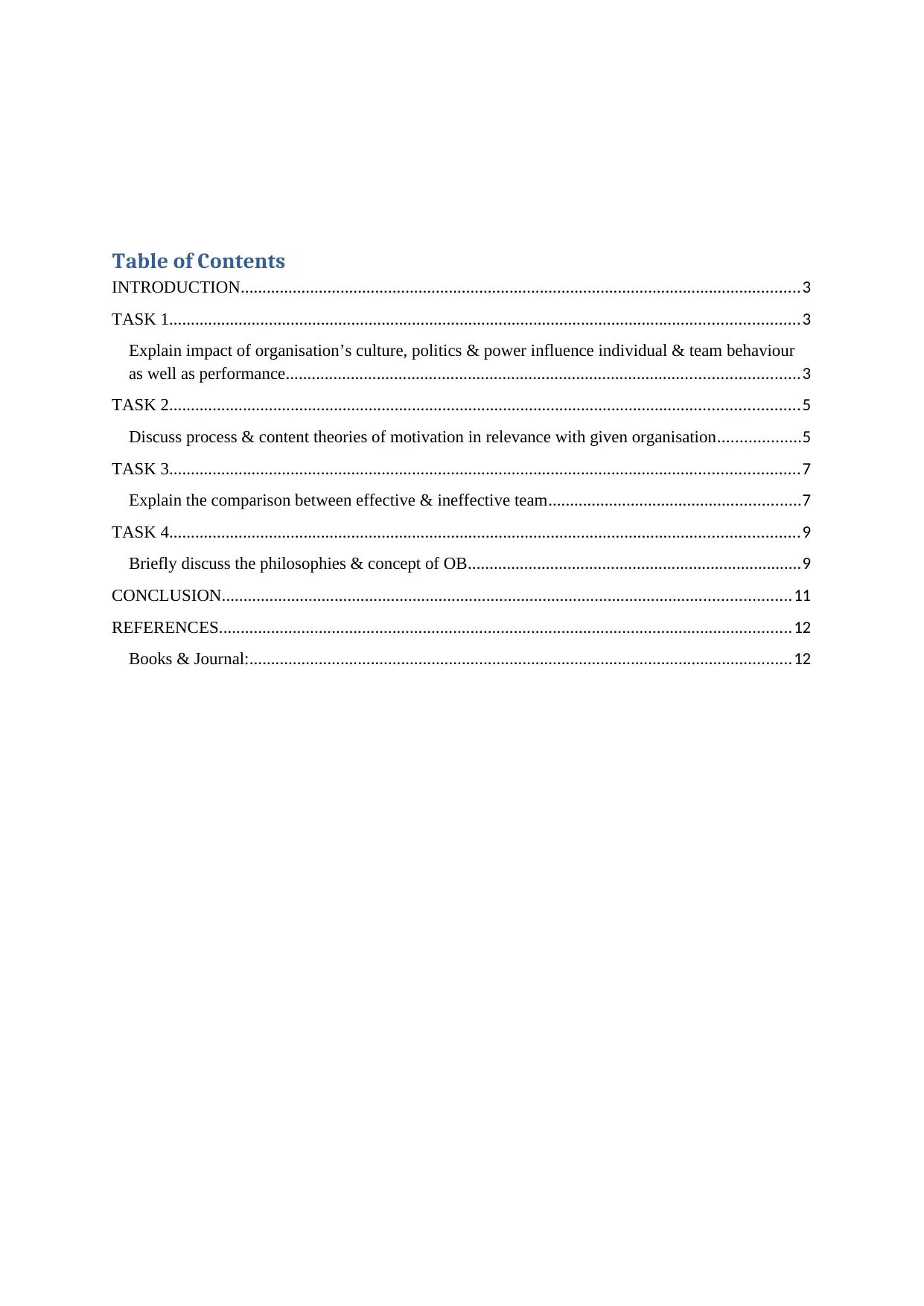
Table of Contents
INTRODUCTION.................................................................................................................................3
TASK 1.................................................................................................................................................3
Explain impact of organisation’s culture, politics & power influence individual & team behaviour
as well as performance......................................................................................................................3
TASK 2.................................................................................................................................................5
Discuss process & content theories of motivation in relevance with given organisation...................5
TASK 3.................................................................................................................................................7
Explain the comparison between effective & ineffective team..........................................................7
TASK 4.................................................................................................................................................9
Briefly discuss the philosophies & concept of OB.............................................................................9
CONCLUSION...................................................................................................................................11
REFERENCES....................................................................................................................................12
Books & Journal:.............................................................................................................................12
INTRODUCTION.................................................................................................................................3
TASK 1.................................................................................................................................................3
Explain impact of organisation’s culture, politics & power influence individual & team behaviour
as well as performance......................................................................................................................3
TASK 2.................................................................................................................................................5
Discuss process & content theories of motivation in relevance with given organisation...................5
TASK 3.................................................................................................................................................7
Explain the comparison between effective & ineffective team..........................................................7
TASK 4.................................................................................................................................................9
Briefly discuss the philosophies & concept of OB.............................................................................9
CONCLUSION...................................................................................................................................11
REFERENCES....................................................................................................................................12
Books & Journal:.............................................................................................................................12
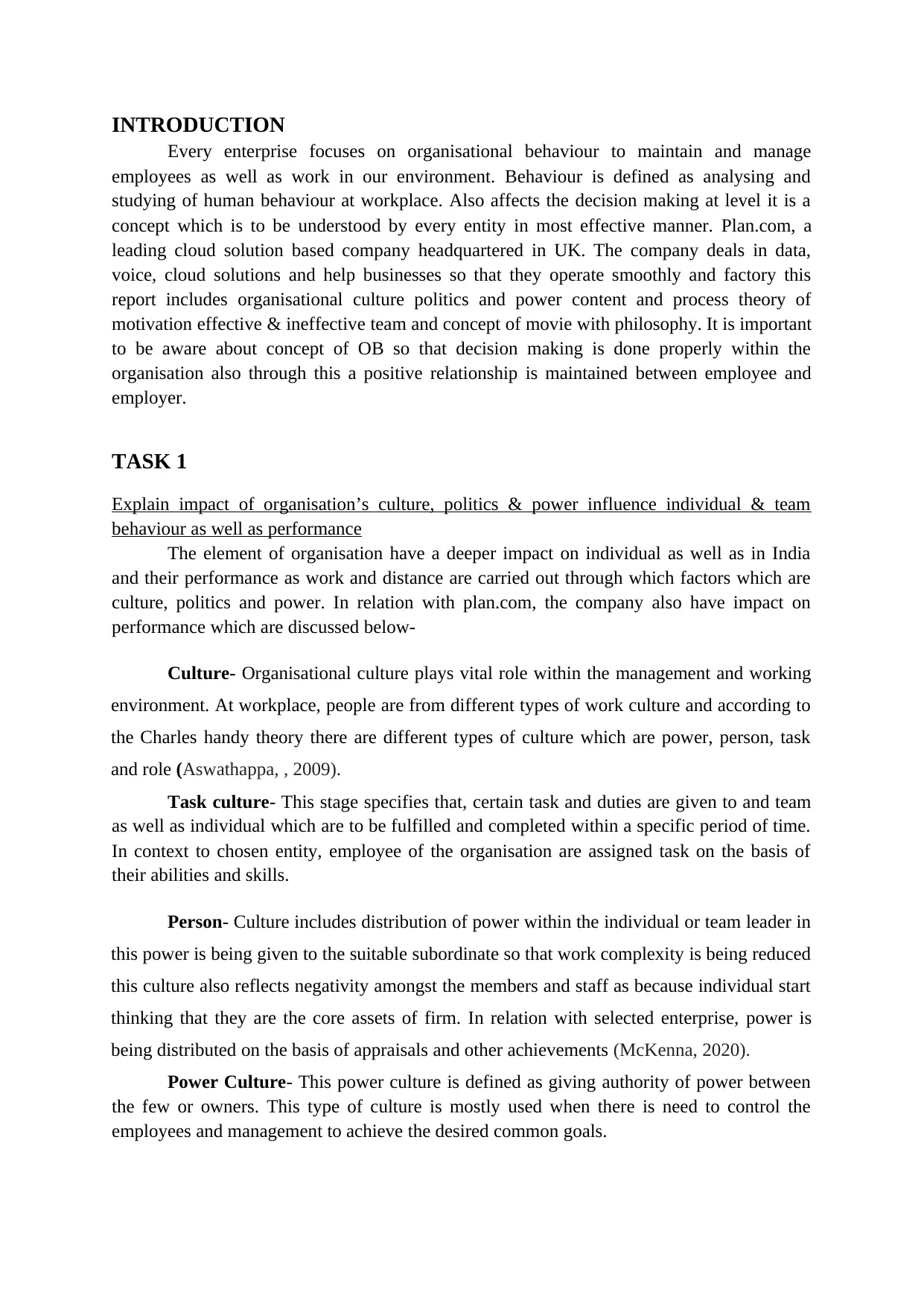
INTRODUCTION
Every enterprise focuses on organisational behaviour to maintain and manage
employees as well as work in our environment. Behaviour is defined as analysing and
studying of human behaviour at workplace. Also affects the decision making at level it is a
concept which is to be understood by every entity in most effective manner. Plan.com, a
leading cloud solution based company headquartered in UK. The company deals in data,
voice, cloud solutions and help businesses so that they operate smoothly and factory this
report includes organisational culture politics and power content and process theory of
motivation effective & ineffective team and concept of movie with philosophy. It is important
to be aware about concept of OB so that decision making is done properly within the
organisation also through this a positive relationship is maintained between employee and
employer.
TASK 1
Explain impact of organisation’s culture, politics & power influence individual & team
behaviour as well as performance
The element of organisation have a deeper impact on individual as well as in India
and their performance as work and distance are carried out through which factors which are
culture, politics and power. In relation with plan.com, the company also have impact on
performance which are discussed below-
Culture- Organisational culture plays vital role within the management and working
environment. At workplace, people are from different types of work culture and according to
the Charles handy theory there are different types of culture which are power, person, task
and role (Aswathappa, , 2009).
Task culture- This stage specifies that, certain task and duties are given to and team
as well as individual which are to be fulfilled and completed within a specific period of time.
In context to chosen entity, employee of the organisation are assigned task on the basis of
their abilities and skills.
Person- Culture includes distribution of power within the individual or team leader in
this power is being given to the suitable subordinate so that work complexity is being reduced
this culture also reflects negativity amongst the members and staff as because individual start
thinking that they are the core assets of firm. In relation with selected enterprise, power is
being distributed on the basis of appraisals and other achievements (McKenna, 2020).
Power Culture- This power culture is defined as giving authority of power between
the few or owners. This type of culture is mostly used when there is need to control the
employees and management to achieve the desired common goals.
Every enterprise focuses on organisational behaviour to maintain and manage
employees as well as work in our environment. Behaviour is defined as analysing and
studying of human behaviour at workplace. Also affects the decision making at level it is a
concept which is to be understood by every entity in most effective manner. Plan.com, a
leading cloud solution based company headquartered in UK. The company deals in data,
voice, cloud solutions and help businesses so that they operate smoothly and factory this
report includes organisational culture politics and power content and process theory of
motivation effective & ineffective team and concept of movie with philosophy. It is important
to be aware about concept of OB so that decision making is done properly within the
organisation also through this a positive relationship is maintained between employee and
employer.
TASK 1
Explain impact of organisation’s culture, politics & power influence individual & team
behaviour as well as performance
The element of organisation have a deeper impact on individual as well as in India
and their performance as work and distance are carried out through which factors which are
culture, politics and power. In relation with plan.com, the company also have impact on
performance which are discussed below-
Culture- Organisational culture plays vital role within the management and working
environment. At workplace, people are from different types of work culture and according to
the Charles handy theory there are different types of culture which are power, person, task
and role (Aswathappa, , 2009).
Task culture- This stage specifies that, certain task and duties are given to and team
as well as individual which are to be fulfilled and completed within a specific period of time.
In context to chosen entity, employee of the organisation are assigned task on the basis of
their abilities and skills.
Person- Culture includes distribution of power within the individual or team leader in
this power is being given to the suitable subordinate so that work complexity is being reduced
this culture also reflects negativity amongst the members and staff as because individual start
thinking that they are the core assets of firm. In relation with selected enterprise, power is
being distributed on the basis of appraisals and other achievements (McKenna, 2020).
Power Culture- This power culture is defined as giving authority of power between
the few or owners. This type of culture is mostly used when there is need to control the
employees and management to achieve the desired common goals.
⊘ This is a preview!⊘
Do you want full access?
Subscribe today to unlock all pages.

Trusted by 1+ million students worldwide
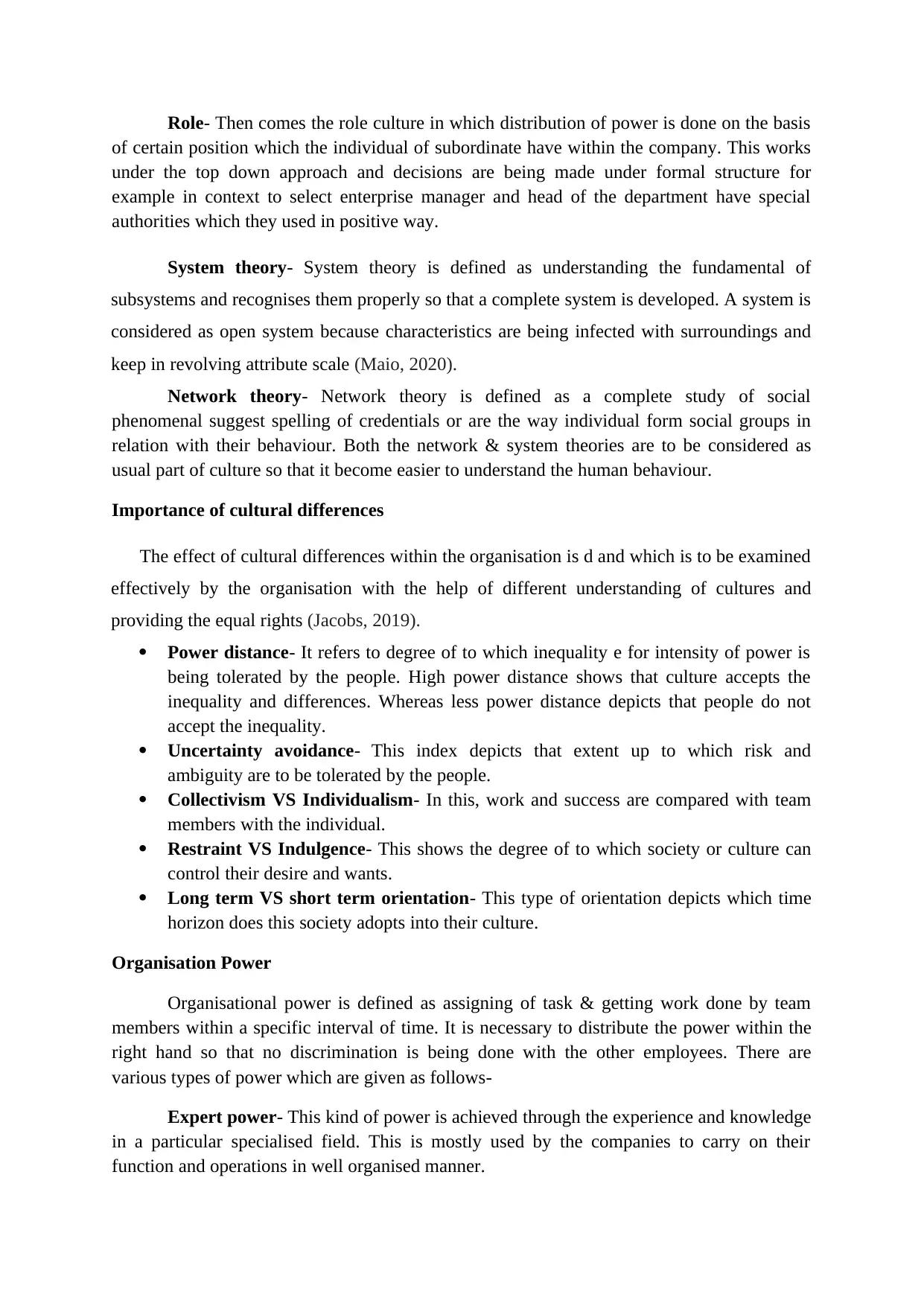
Role- Then comes the role culture in which distribution of power is done on the basis
of certain position which the individual of subordinate have within the company. This works
under the top down approach and decisions are being made under formal structure for
example in context to select enterprise manager and head of the department have special
authorities which they used in positive way.
System theory- System theory is defined as understanding the fundamental of
subsystems and recognises them properly so that a complete system is developed. A system is
considered as open system because characteristics are being infected with surroundings and
keep in revolving attribute scale (Maio, 2020).
Network theory- Network theory is defined as a complete study of social
phenomenal suggest spelling of credentials or are the way individual form social groups in
relation with their behaviour. Both the network & system theories are to be considered as
usual part of culture so that it become easier to understand the human behaviour.
Importance of cultural differences
The effect of cultural differences within the organisation is d and which is to be examined
effectively by the organisation with the help of different understanding of cultures and
providing the equal rights (Jacobs, 2019).
Power distance- It refers to degree of to which inequality e for intensity of power is
being tolerated by the people. High power distance shows that culture accepts the
inequality and differences. Whereas less power distance depicts that people do not
accept the inequality.
Uncertainty avoidance- This index depicts that extent up to which risk and
ambiguity are to be tolerated by the people.
Collectivism VS Individualism- In this, work and success are compared with team
members with the individual.
Restraint VS Indulgence- This shows the degree of to which society or culture can
control their desire and wants.
Long term VS short term orientation- This type of orientation depicts which time
horizon does this society adopts into their culture.
Organisation Power
Organisational power is defined as assigning of task & getting work done by team
members within a specific interval of time. It is necessary to distribute the power within the
right hand so that no discrimination is being done with the other employees. There are
various types of power which are given as follows-
Expert power- This kind of power is achieved through the experience and knowledge
in a particular specialised field. This is mostly used by the companies to carry on their
function and operations in well organised manner.
of certain position which the individual of subordinate have within the company. This works
under the top down approach and decisions are being made under formal structure for
example in context to select enterprise manager and head of the department have special
authorities which they used in positive way.
System theory- System theory is defined as understanding the fundamental of
subsystems and recognises them properly so that a complete system is developed. A system is
considered as open system because characteristics are being infected with surroundings and
keep in revolving attribute scale (Maio, 2020).
Network theory- Network theory is defined as a complete study of social
phenomenal suggest spelling of credentials or are the way individual form social groups in
relation with their behaviour. Both the network & system theories are to be considered as
usual part of culture so that it become easier to understand the human behaviour.
Importance of cultural differences
The effect of cultural differences within the organisation is d and which is to be examined
effectively by the organisation with the help of different understanding of cultures and
providing the equal rights (Jacobs, 2019).
Power distance- It refers to degree of to which inequality e for intensity of power is
being tolerated by the people. High power distance shows that culture accepts the
inequality and differences. Whereas less power distance depicts that people do not
accept the inequality.
Uncertainty avoidance- This index depicts that extent up to which risk and
ambiguity are to be tolerated by the people.
Collectivism VS Individualism- In this, work and success are compared with team
members with the individual.
Restraint VS Indulgence- This shows the degree of to which society or culture can
control their desire and wants.
Long term VS short term orientation- This type of orientation depicts which time
horizon does this society adopts into their culture.
Organisation Power
Organisational power is defined as assigning of task & getting work done by team
members within a specific interval of time. It is necessary to distribute the power within the
right hand so that no discrimination is being done with the other employees. There are
various types of power which are given as follows-
Expert power- This kind of power is achieved through the experience and knowledge
in a particular specialised field. This is mostly used by the companies to carry on their
function and operations in well organised manner.
Paraphrase This Document
Need a fresh take? Get an instant paraphrase of this document with our AI Paraphraser
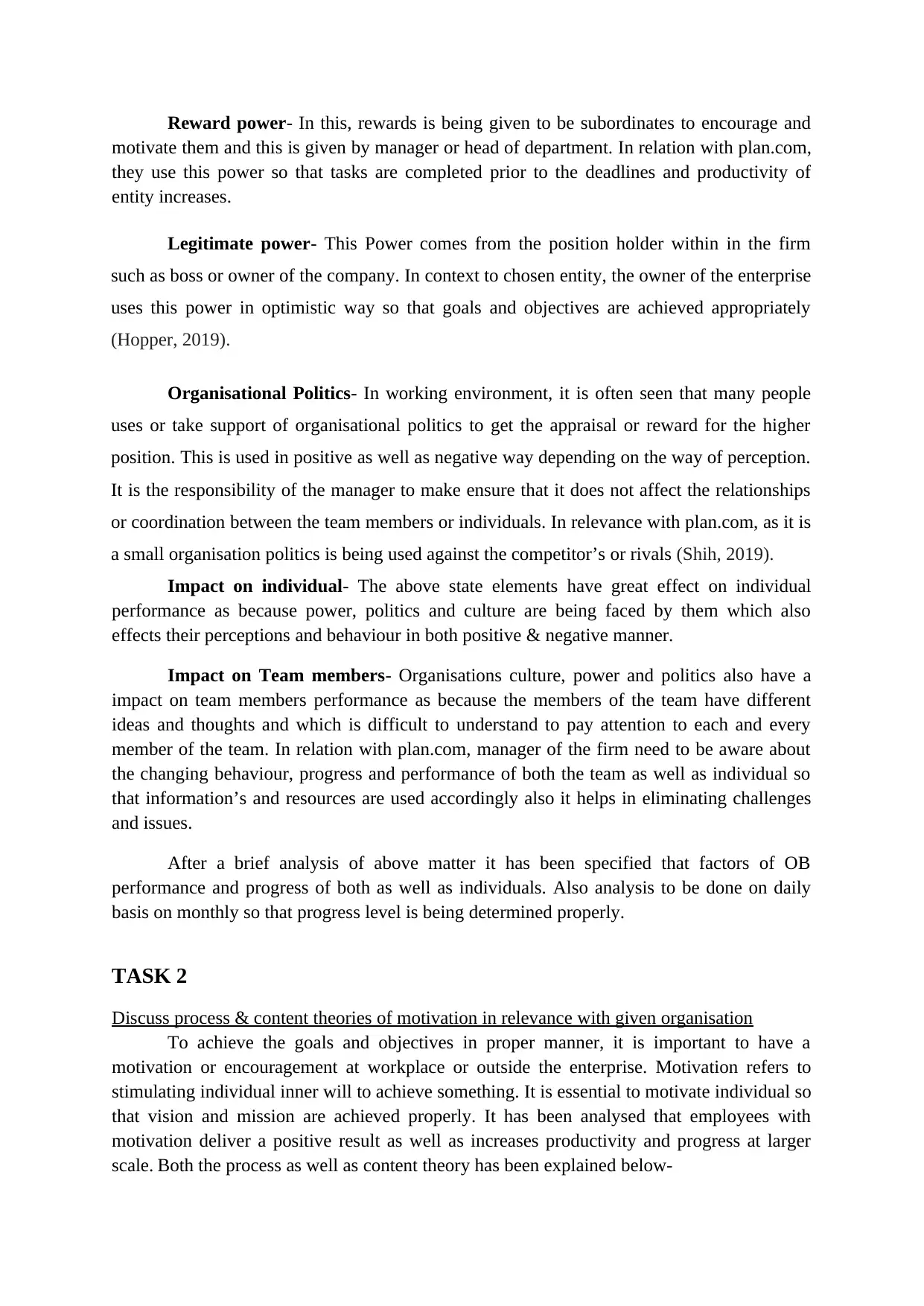
Reward power- In this, rewards is being given to be subordinates to encourage and
motivate them and this is given by manager or head of department. In relation with plan.com,
they use this power so that tasks are completed prior to the deadlines and productivity of
entity increases.
Legitimate power- This Power comes from the position holder within in the firm
such as boss or owner of the company. In context to chosen entity, the owner of the enterprise
uses this power in optimistic way so that goals and objectives are achieved appropriately
(Hopper, 2019).
Organisational Politics- In working environment, it is often seen that many people
uses or take support of organisational politics to get the appraisal or reward for the higher
position. This is used in positive as well as negative way depending on the way of perception.
It is the responsibility of the manager to make ensure that it does not affect the relationships
or coordination between the team members or individuals. In relevance with plan.com, as it is
a small organisation politics is being used against the competitor’s or rivals (Shih, 2019).
Impact on individual- The above state elements have great effect on individual
performance as because power, politics and culture are being faced by them which also
effects their perceptions and behaviour in both positive & negative manner.
Impact on Team members- Organisations culture, power and politics also have a
impact on team members performance as because the members of the team have different
ideas and thoughts and which is difficult to understand to pay attention to each and every
member of the team. In relation with plan.com, manager of the firm need to be aware about
the changing behaviour, progress and performance of both the team as well as individual so
that information’s and resources are used accordingly also it helps in eliminating challenges
and issues.
After a brief analysis of above matter it has been specified that factors of OB
performance and progress of both as well as individuals. Also analysis to be done on daily
basis on monthly so that progress level is being determined properly.
TASK 2
Discuss process & content theories of motivation in relevance with given organisation
To achieve the goals and objectives in proper manner, it is important to have a
motivation or encouragement at workplace or outside the enterprise. Motivation refers to
stimulating individual inner will to achieve something. It is essential to motivate individual so
that vision and mission are achieved properly. It has been analysed that employees with
motivation deliver a positive result as well as increases productivity and progress at larger
scale. Both the process as well as content theory has been explained below-
motivate them and this is given by manager or head of department. In relation with plan.com,
they use this power so that tasks are completed prior to the deadlines and productivity of
entity increases.
Legitimate power- This Power comes from the position holder within in the firm
such as boss or owner of the company. In context to chosen entity, the owner of the enterprise
uses this power in optimistic way so that goals and objectives are achieved appropriately
(Hopper, 2019).
Organisational Politics- In working environment, it is often seen that many people
uses or take support of organisational politics to get the appraisal or reward for the higher
position. This is used in positive as well as negative way depending on the way of perception.
It is the responsibility of the manager to make ensure that it does not affect the relationships
or coordination between the team members or individuals. In relevance with plan.com, as it is
a small organisation politics is being used against the competitor’s or rivals (Shih, 2019).
Impact on individual- The above state elements have great effect on individual
performance as because power, politics and culture are being faced by them which also
effects their perceptions and behaviour in both positive & negative manner.
Impact on Team members- Organisations culture, power and politics also have a
impact on team members performance as because the members of the team have different
ideas and thoughts and which is difficult to understand to pay attention to each and every
member of the team. In relation with plan.com, manager of the firm need to be aware about
the changing behaviour, progress and performance of both the team as well as individual so
that information’s and resources are used accordingly also it helps in eliminating challenges
and issues.
After a brief analysis of above matter it has been specified that factors of OB
performance and progress of both as well as individuals. Also analysis to be done on daily
basis on monthly so that progress level is being determined properly.
TASK 2
Discuss process & content theories of motivation in relevance with given organisation
To achieve the goals and objectives in proper manner, it is important to have a
motivation or encouragement at workplace or outside the enterprise. Motivation refers to
stimulating individual inner will to achieve something. It is essential to motivate individual so
that vision and mission are achieved properly. It has been analysed that employees with
motivation deliver a positive result as well as increases productivity and progress at larger
scale. Both the process as well as content theory has been explained below-
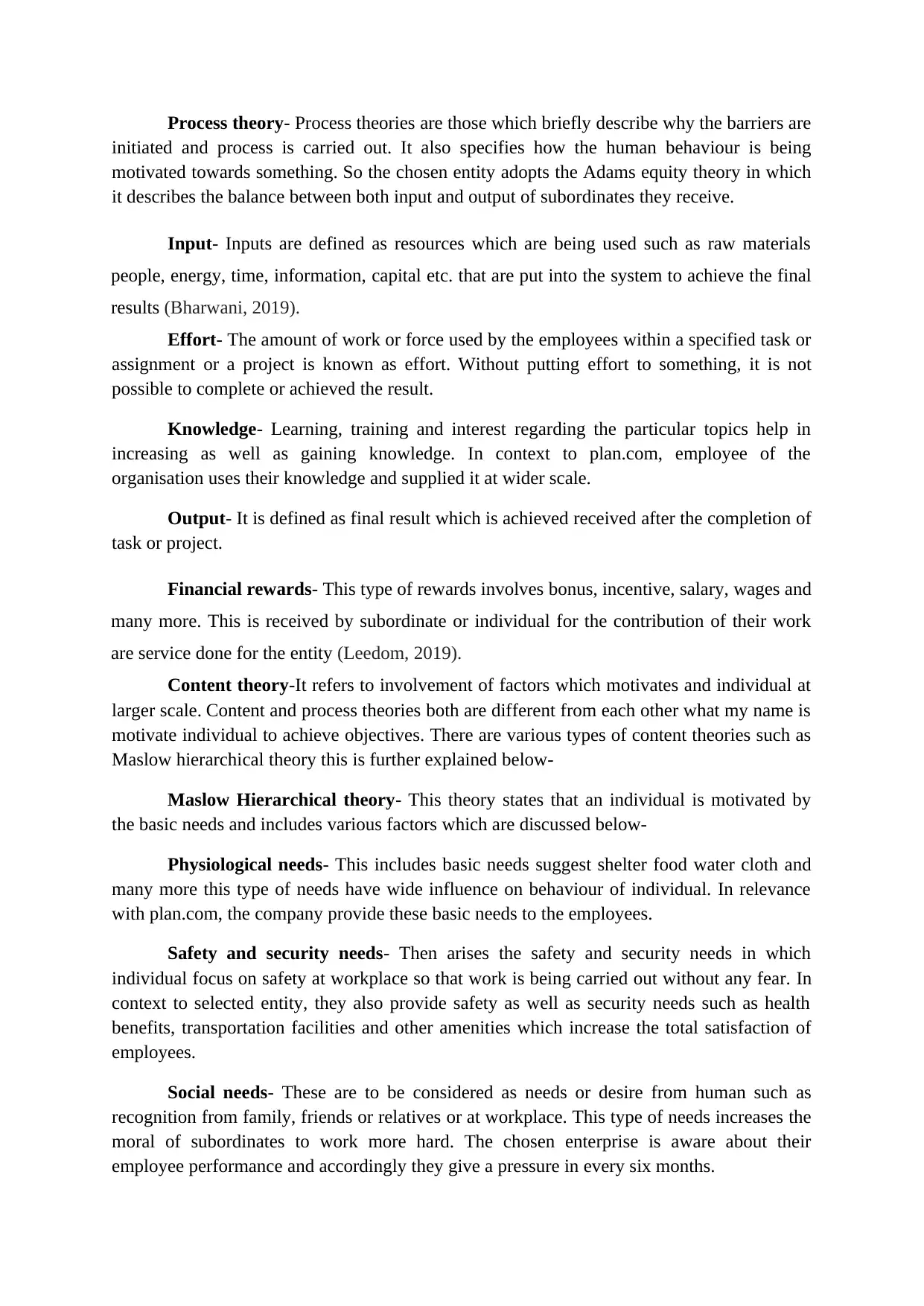
Process theory- Process theories are those which briefly describe why the barriers are
initiated and process is carried out. It also specifies how the human behaviour is being
motivated towards something. So the chosen entity adopts the Adams equity theory in which
it describes the balance between both input and output of subordinates they receive.
Input- Inputs are defined as resources which are being used such as raw materials
people, energy, time, information, capital etc. that are put into the system to achieve the final
results (Bharwani, 2019).
Effort- The amount of work or force used by the employees within a specified task or
assignment or a project is known as effort. Without putting effort to something, it is not
possible to complete or achieved the result.
Knowledge- Learning, training and interest regarding the particular topics help in
increasing as well as gaining knowledge. In context to plan.com, employee of the
organisation uses their knowledge and supplied it at wider scale.
Output- It is defined as final result which is achieved received after the completion of
task or project.
Financial rewards- This type of rewards involves bonus, incentive, salary, wages and
many more. This is received by subordinate or individual for the contribution of their work
are service done for the entity (Leedom, 2019).
Content theory-It refers to involvement of factors which motivates and individual at
larger scale. Content and process theories both are different from each other what my name is
motivate individual to achieve objectives. There are various types of content theories such as
Maslow hierarchical theory this is further explained below-
Maslow Hierarchical theory- This theory states that an individual is motivated by
the basic needs and includes various factors which are discussed below-
Physiological needs- This includes basic needs suggest shelter food water cloth and
many more this type of needs have wide influence on behaviour of individual. In relevance
with plan.com, the company provide these basic needs to the employees.
Safety and security needs- Then arises the safety and security needs in which
individual focus on safety at workplace so that work is being carried out without any fear. In
context to selected entity, they also provide safety as well as security needs such as health
benefits, transportation facilities and other amenities which increase the total satisfaction of
employees.
Social needs- These are to be considered as needs or desire from human such as
recognition from family, friends or relatives or at workplace. This type of needs increases the
moral of subordinates to work more hard. The chosen enterprise is aware about their
employee performance and accordingly they give a pressure in every six months.
initiated and process is carried out. It also specifies how the human behaviour is being
motivated towards something. So the chosen entity adopts the Adams equity theory in which
it describes the balance between both input and output of subordinates they receive.
Input- Inputs are defined as resources which are being used such as raw materials
people, energy, time, information, capital etc. that are put into the system to achieve the final
results (Bharwani, 2019).
Effort- The amount of work or force used by the employees within a specified task or
assignment or a project is known as effort. Without putting effort to something, it is not
possible to complete or achieved the result.
Knowledge- Learning, training and interest regarding the particular topics help in
increasing as well as gaining knowledge. In context to plan.com, employee of the
organisation uses their knowledge and supplied it at wider scale.
Output- It is defined as final result which is achieved received after the completion of
task or project.
Financial rewards- This type of rewards involves bonus, incentive, salary, wages and
many more. This is received by subordinate or individual for the contribution of their work
are service done for the entity (Leedom, 2019).
Content theory-It refers to involvement of factors which motivates and individual at
larger scale. Content and process theories both are different from each other what my name is
motivate individual to achieve objectives. There are various types of content theories such as
Maslow hierarchical theory this is further explained below-
Maslow Hierarchical theory- This theory states that an individual is motivated by
the basic needs and includes various factors which are discussed below-
Physiological needs- This includes basic needs suggest shelter food water cloth and
many more this type of needs have wide influence on behaviour of individual. In relevance
with plan.com, the company provide these basic needs to the employees.
Safety and security needs- Then arises the safety and security needs in which
individual focus on safety at workplace so that work is being carried out without any fear. In
context to selected entity, they also provide safety as well as security needs such as health
benefits, transportation facilities and other amenities which increase the total satisfaction of
employees.
Social needs- These are to be considered as needs or desire from human such as
recognition from family, friends or relatives or at workplace. This type of needs increases the
moral of subordinates to work more hard. The chosen enterprise is aware about their
employee performance and accordingly they give a pressure in every six months.
⊘ This is a preview!⊘
Do you want full access?
Subscribe today to unlock all pages.

Trusted by 1+ million students worldwide
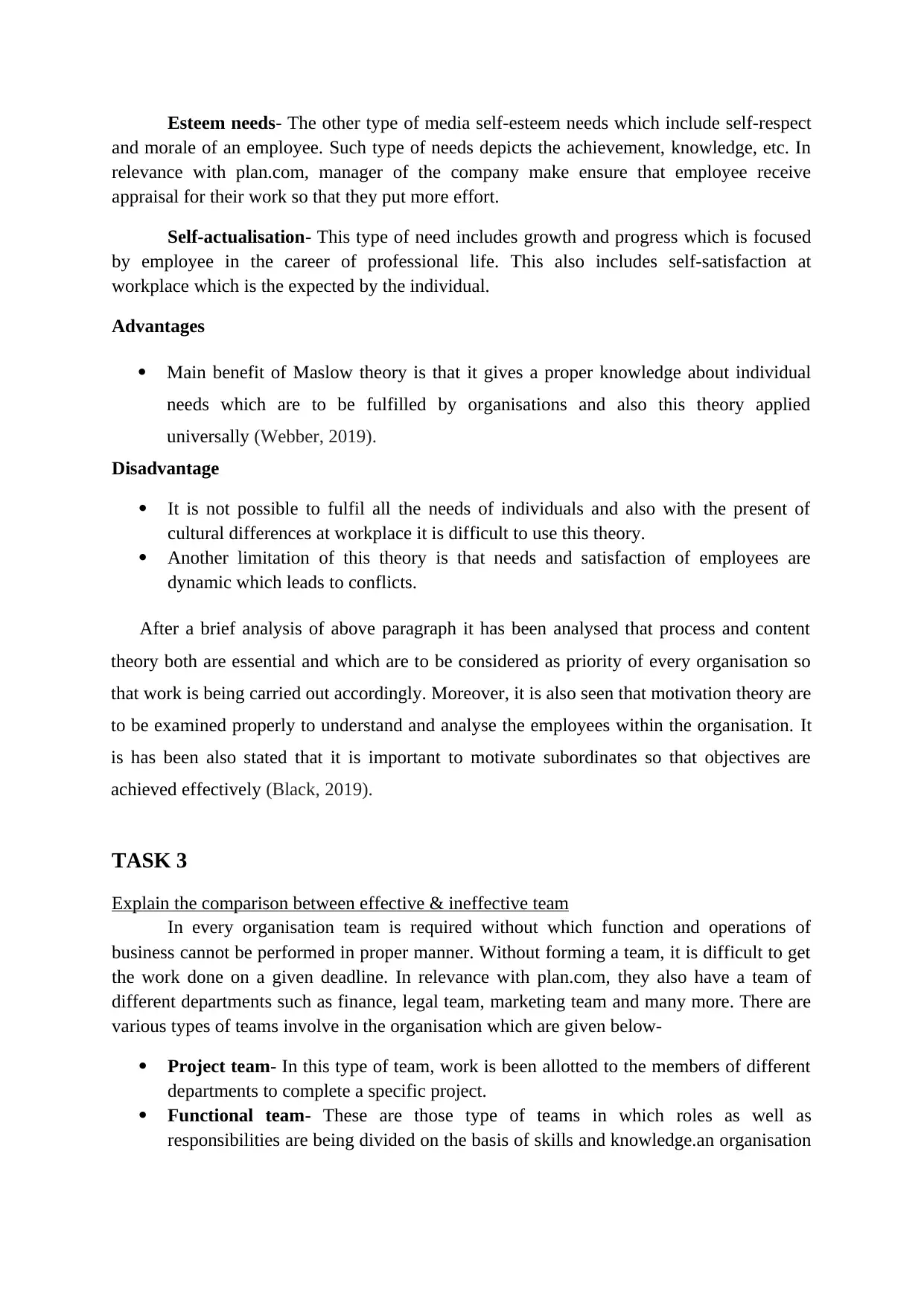
Esteem needs- The other type of media self-esteem needs which include self-respect
and morale of an employee. Such type of needs depicts the achievement, knowledge, etc. In
relevance with plan.com, manager of the company make ensure that employee receive
appraisal for their work so that they put more effort.
Self-actualisation- This type of need includes growth and progress which is focused
by employee in the career of professional life. This also includes self-satisfaction at
workplace which is the expected by the individual.
Advantages
Main benefit of Maslow theory is that it gives a proper knowledge about individual
needs which are to be fulfilled by organisations and also this theory applied
universally (Webber, 2019).
Disadvantage
It is not possible to fulfil all the needs of individuals and also with the present of
cultural differences at workplace it is difficult to use this theory.
Another limitation of this theory is that needs and satisfaction of employees are
dynamic which leads to conflicts.
After a brief analysis of above paragraph it has been analysed that process and content
theory both are essential and which are to be considered as priority of every organisation so
that work is being carried out accordingly. Moreover, it is also seen that motivation theory are
to be examined properly to understand and analyse the employees within the organisation. It
is has been also stated that it is important to motivate subordinates so that objectives are
achieved effectively (Black, 2019).
TASK 3
Explain the comparison between effective & ineffective team
In every organisation team is required without which function and operations of
business cannot be performed in proper manner. Without forming a team, it is difficult to get
the work done on a given deadline. In relevance with plan.com, they also have a team of
different departments such as finance, legal team, marketing team and many more. There are
various types of teams involve in the organisation which are given below-
Project team- In this type of team, work is been allotted to the members of different
departments to complete a specific project.
Functional team- These are those type of teams in which roles as well as
responsibilities are being divided on the basis of skills and knowledge.an organisation
and morale of an employee. Such type of needs depicts the achievement, knowledge, etc. In
relevance with plan.com, manager of the company make ensure that employee receive
appraisal for their work so that they put more effort.
Self-actualisation- This type of need includes growth and progress which is focused
by employee in the career of professional life. This also includes self-satisfaction at
workplace which is the expected by the individual.
Advantages
Main benefit of Maslow theory is that it gives a proper knowledge about individual
needs which are to be fulfilled by organisations and also this theory applied
universally (Webber, 2019).
Disadvantage
It is not possible to fulfil all the needs of individuals and also with the present of
cultural differences at workplace it is difficult to use this theory.
Another limitation of this theory is that needs and satisfaction of employees are
dynamic which leads to conflicts.
After a brief analysis of above paragraph it has been analysed that process and content
theory both are essential and which are to be considered as priority of every organisation so
that work is being carried out accordingly. Moreover, it is also seen that motivation theory are
to be examined properly to understand and analyse the employees within the organisation. It
is has been also stated that it is important to motivate subordinates so that objectives are
achieved effectively (Black, 2019).
TASK 3
Explain the comparison between effective & ineffective team
In every organisation team is required without which function and operations of
business cannot be performed in proper manner. Without forming a team, it is difficult to get
the work done on a given deadline. In relevance with plan.com, they also have a team of
different departments such as finance, legal team, marketing team and many more. There are
various types of teams involve in the organisation which are given below-
Project team- In this type of team, work is been allotted to the members of different
departments to complete a specific project.
Functional team- These are those type of teams in which roles as well as
responsibilities are being divided on the basis of skills and knowledge.an organisation
Paraphrase This Document
Need a fresh take? Get an instant paraphrase of this document with our AI Paraphraser
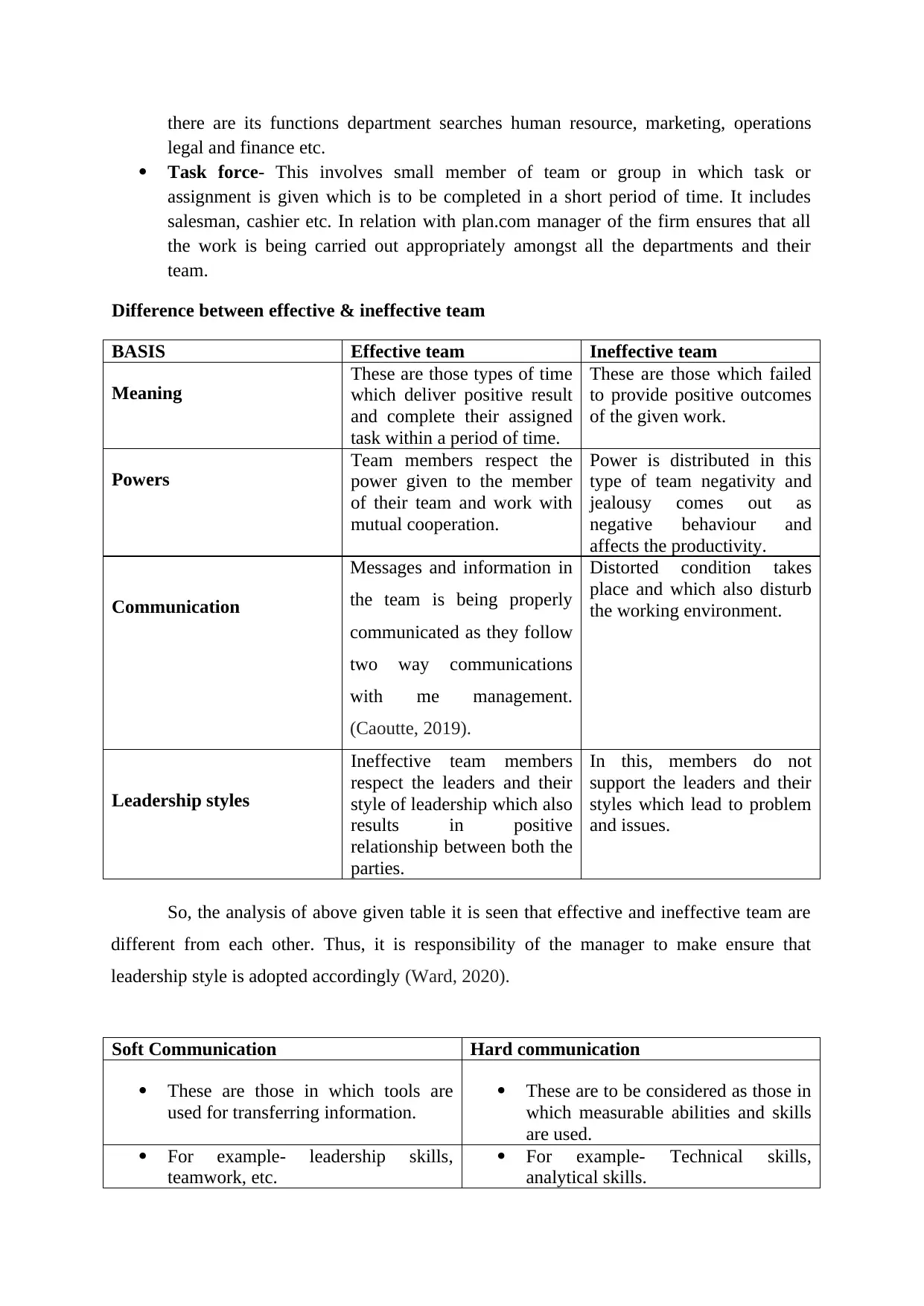
there are its functions department searches human resource, marketing, operations
legal and finance etc.
Task force- This involves small member of team or group in which task or
assignment is given which is to be completed in a short period of time. It includes
salesman, cashier etc. In relation with plan.com manager of the firm ensures that all
the work is being carried out appropriately amongst all the departments and their
team.
Difference between effective & ineffective team
BASIS Effective team Ineffective team
Meaning
These are those types of time
which deliver positive result
and complete their assigned
task within a period of time.
These are those which failed
to provide positive outcomes
of the given work.
Powers
Team members respect the
power given to the member
of their team and work with
mutual cooperation.
Power is distributed in this
type of team negativity and
jealousy comes out as
negative behaviour and
affects the productivity.
Communication
Messages and information in
the team is being properly
communicated as they follow
two way communications
with me management.
(Caoutte, 2019).
Distorted condition takes
place and which also disturb
the working environment.
Leadership styles
Ineffective team members
respect the leaders and their
style of leadership which also
results in positive
relationship between both the
parties.
In this, members do not
support the leaders and their
styles which lead to problem
and issues.
So, the analysis of above given table it is seen that effective and ineffective team are
different from each other. Thus, it is responsibility of the manager to make ensure that
leadership style is adopted accordingly (Ward, 2020).
Soft Communication Hard communication
These are those in which tools are
used for transferring information.
These are to be considered as those in
which measurable abilities and skills
are used.
For example- leadership skills,
teamwork, etc.
For example- Technical skills,
analytical skills.
legal and finance etc.
Task force- This involves small member of team or group in which task or
assignment is given which is to be completed in a short period of time. It includes
salesman, cashier etc. In relation with plan.com manager of the firm ensures that all
the work is being carried out appropriately amongst all the departments and their
team.
Difference between effective & ineffective team
BASIS Effective team Ineffective team
Meaning
These are those types of time
which deliver positive result
and complete their assigned
task within a period of time.
These are those which failed
to provide positive outcomes
of the given work.
Powers
Team members respect the
power given to the member
of their team and work with
mutual cooperation.
Power is distributed in this
type of team negativity and
jealousy comes out as
negative behaviour and
affects the productivity.
Communication
Messages and information in
the team is being properly
communicated as they follow
two way communications
with me management.
(Caoutte, 2019).
Distorted condition takes
place and which also disturb
the working environment.
Leadership styles
Ineffective team members
respect the leaders and their
style of leadership which also
results in positive
relationship between both the
parties.
In this, members do not
support the leaders and their
styles which lead to problem
and issues.
So, the analysis of above given table it is seen that effective and ineffective team are
different from each other. Thus, it is responsibility of the manager to make ensure that
leadership style is adopted accordingly (Ward, 2020).
Soft Communication Hard communication
These are those in which tools are
used for transferring information.
These are to be considered as those in
which measurable abilities and skills
are used.
For example- leadership skills,
teamwork, etc.
For example- Technical skills,
analytical skills.
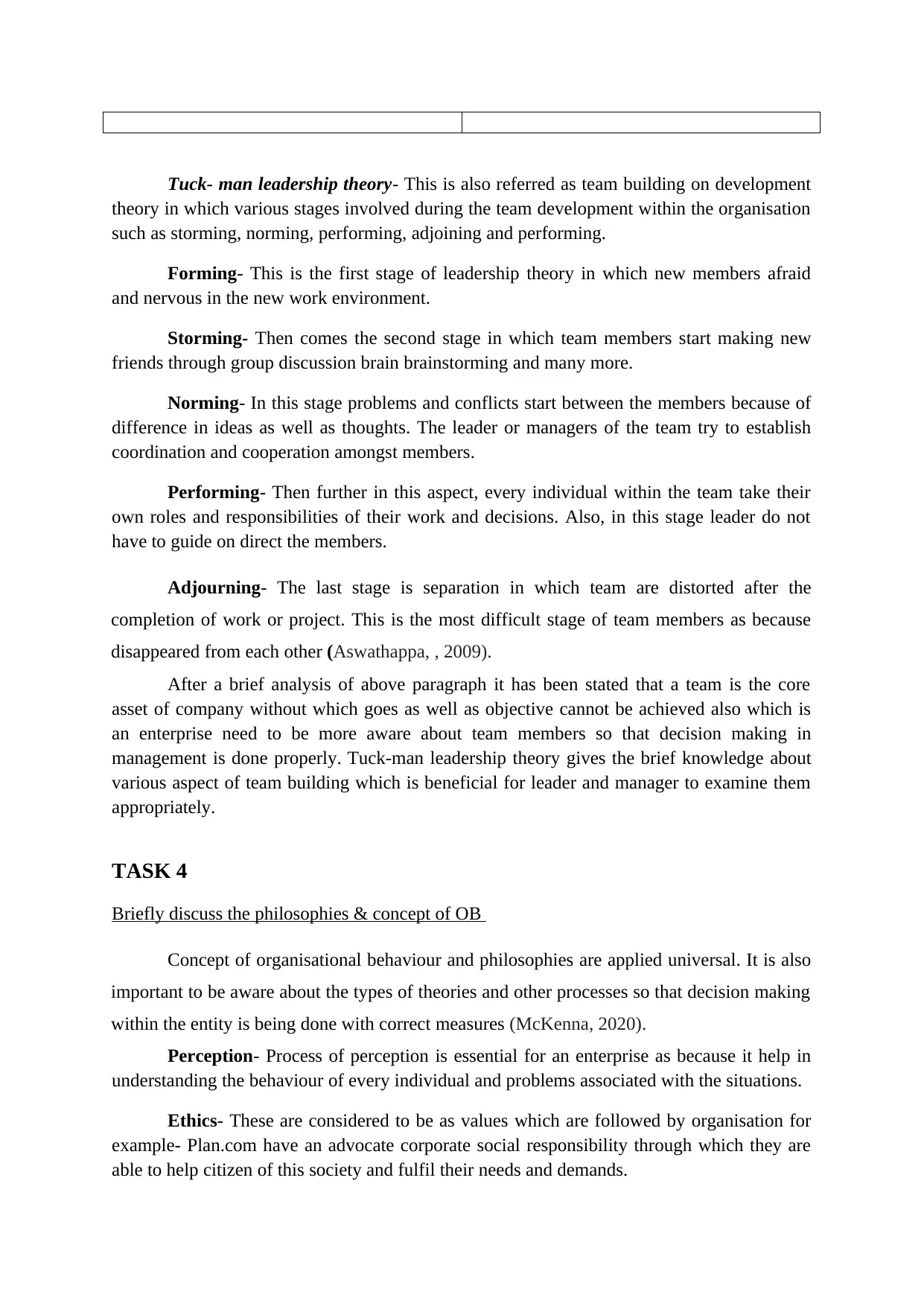
Tuck- man leadership theory- This is also referred as team building on development
theory in which various stages involved during the team development within the organisation
such as storming, norming, performing, adjoining and performing.
Forming- This is the first stage of leadership theory in which new members afraid
and nervous in the new work environment.
Storming- Then comes the second stage in which team members start making new
friends through group discussion brain brainstorming and many more.
Norming- In this stage problems and conflicts start between the members because of
difference in ideas as well as thoughts. The leader or managers of the team try to establish
coordination and cooperation amongst members.
Performing- Then further in this aspect, every individual within the team take their
own roles and responsibilities of their work and decisions. Also, in this stage leader do not
have to guide on direct the members.
Adjourning- The last stage is separation in which team are distorted after the
completion of work or project. This is the most difficult stage of team members as because
disappeared from each other (Aswathappa, , 2009).
After a brief analysis of above paragraph it has been stated that a team is the core
asset of company without which goes as well as objective cannot be achieved also which is
an enterprise need to be more aware about team members so that decision making in
management is done properly. Tuck-man leadership theory gives the brief knowledge about
various aspect of team building which is beneficial for leader and manager to examine them
appropriately.
TASK 4
Briefly discuss the philosophies & concept of OB
Concept of organisational behaviour and philosophies are applied universal. It is also
important to be aware about the types of theories and other processes so that decision making
within the entity is being done with correct measures (McKenna, 2020).
Perception- Process of perception is essential for an enterprise as because it help in
understanding the behaviour of every individual and problems associated with the situations.
Ethics- These are considered to be as values which are followed by organisation for
example- Plan.com have an advocate corporate social responsibility through which they are
able to help citizen of this society and fulfil their needs and demands.
theory in which various stages involved during the team development within the organisation
such as storming, norming, performing, adjoining and performing.
Forming- This is the first stage of leadership theory in which new members afraid
and nervous in the new work environment.
Storming- Then comes the second stage in which team members start making new
friends through group discussion brain brainstorming and many more.
Norming- In this stage problems and conflicts start between the members because of
difference in ideas as well as thoughts. The leader or managers of the team try to establish
coordination and cooperation amongst members.
Performing- Then further in this aspect, every individual within the team take their
own roles and responsibilities of their work and decisions. Also, in this stage leader do not
have to guide on direct the members.
Adjourning- The last stage is separation in which team are distorted after the
completion of work or project. This is the most difficult stage of team members as because
disappeared from each other (Aswathappa, , 2009).
After a brief analysis of above paragraph it has been stated that a team is the core
asset of company without which goes as well as objective cannot be achieved also which is
an enterprise need to be more aware about team members so that decision making in
management is done properly. Tuck-man leadership theory gives the brief knowledge about
various aspect of team building which is beneficial for leader and manager to examine them
appropriately.
TASK 4
Briefly discuss the philosophies & concept of OB
Concept of organisational behaviour and philosophies are applied universal. It is also
important to be aware about the types of theories and other processes so that decision making
within the entity is being done with correct measures (McKenna, 2020).
Perception- Process of perception is essential for an enterprise as because it help in
understanding the behaviour of every individual and problems associated with the situations.
Ethics- These are considered to be as values which are followed by organisation for
example- Plan.com have an advocate corporate social responsibility through which they are
able to help citizen of this society and fulfil their needs and demands.
⊘ This is a preview!⊘
Do you want full access?
Subscribe today to unlock all pages.

Trusted by 1+ million students worldwide
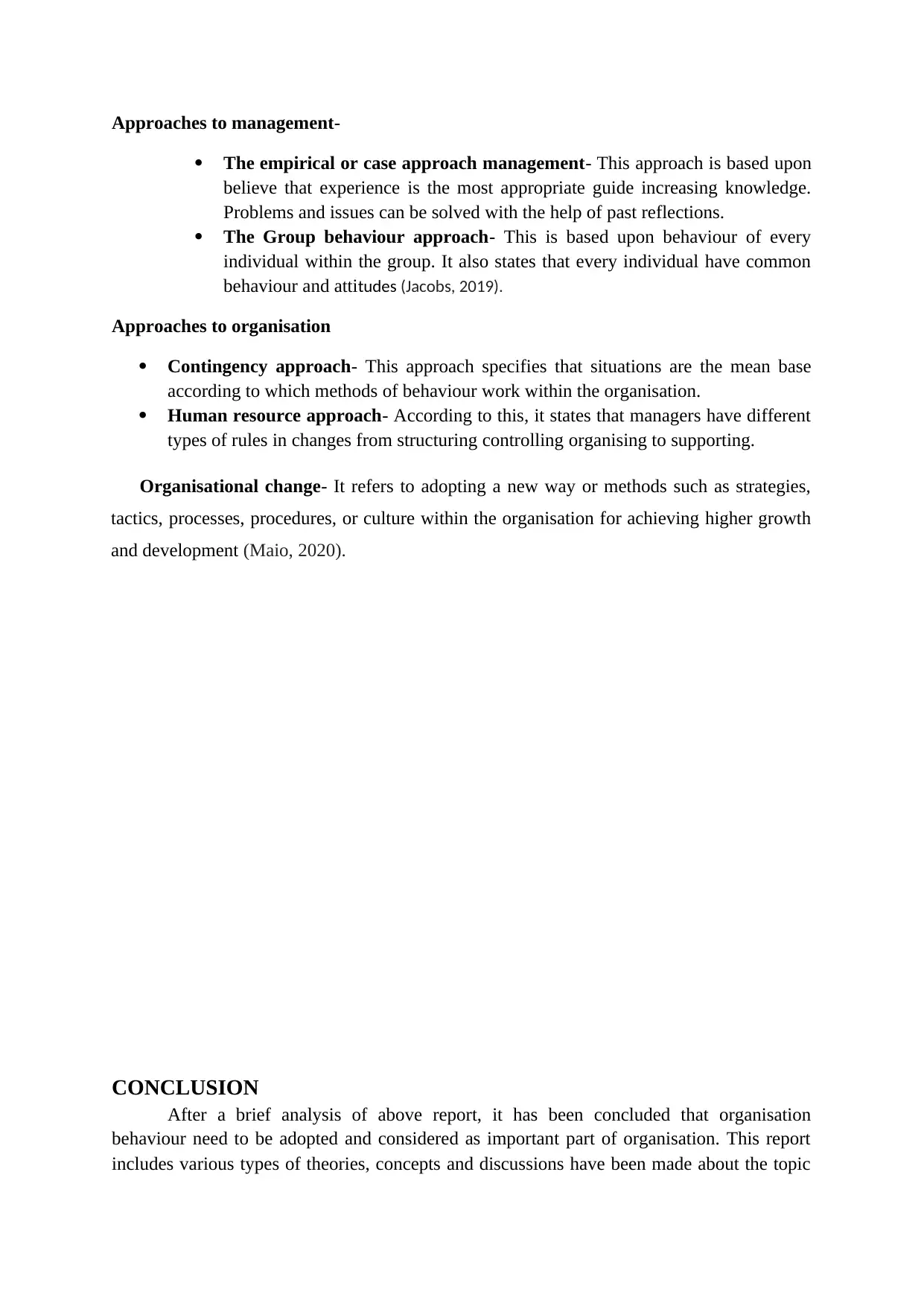
Approaches to management-
The empirical or case approach management- This approach is based upon
believe that experience is the most appropriate guide increasing knowledge.
Problems and issues can be solved with the help of past reflections.
The Group behaviour approach- This is based upon behaviour of every
individual within the group. It also states that every individual have common
behaviour and attitudes (Jacobs, 2019).
Approaches to organisation
Contingency approach- This approach specifies that situations are the mean base
according to which methods of behaviour work within the organisation.
Human resource approach- According to this, it states that managers have different
types of rules in changes from structuring controlling organising to supporting.
Organisational change- It refers to adopting a new way or methods such as strategies,
tactics, processes, procedures, or culture within the organisation for achieving higher growth
and development (Maio, 2020).
CONCLUSION
After a brief analysis of above report, it has been concluded that organisation
behaviour need to be adopted and considered as important part of organisation. This report
includes various types of theories, concepts and discussions have been made about the topic
The empirical or case approach management- This approach is based upon
believe that experience is the most appropriate guide increasing knowledge.
Problems and issues can be solved with the help of past reflections.
The Group behaviour approach- This is based upon behaviour of every
individual within the group. It also states that every individual have common
behaviour and attitudes (Jacobs, 2019).
Approaches to organisation
Contingency approach- This approach specifies that situations are the mean base
according to which methods of behaviour work within the organisation.
Human resource approach- According to this, it states that managers have different
types of rules in changes from structuring controlling organising to supporting.
Organisational change- It refers to adopting a new way or methods such as strategies,
tactics, processes, procedures, or culture within the organisation for achieving higher growth
and development (Maio, 2020).
CONCLUSION
After a brief analysis of above report, it has been concluded that organisation
behaviour need to be adopted and considered as important part of organisation. This report
includes various types of theories, concepts and discussions have been made about the topic
Paraphrase This Document
Need a fresh take? Get an instant paraphrase of this document with our AI Paraphraser
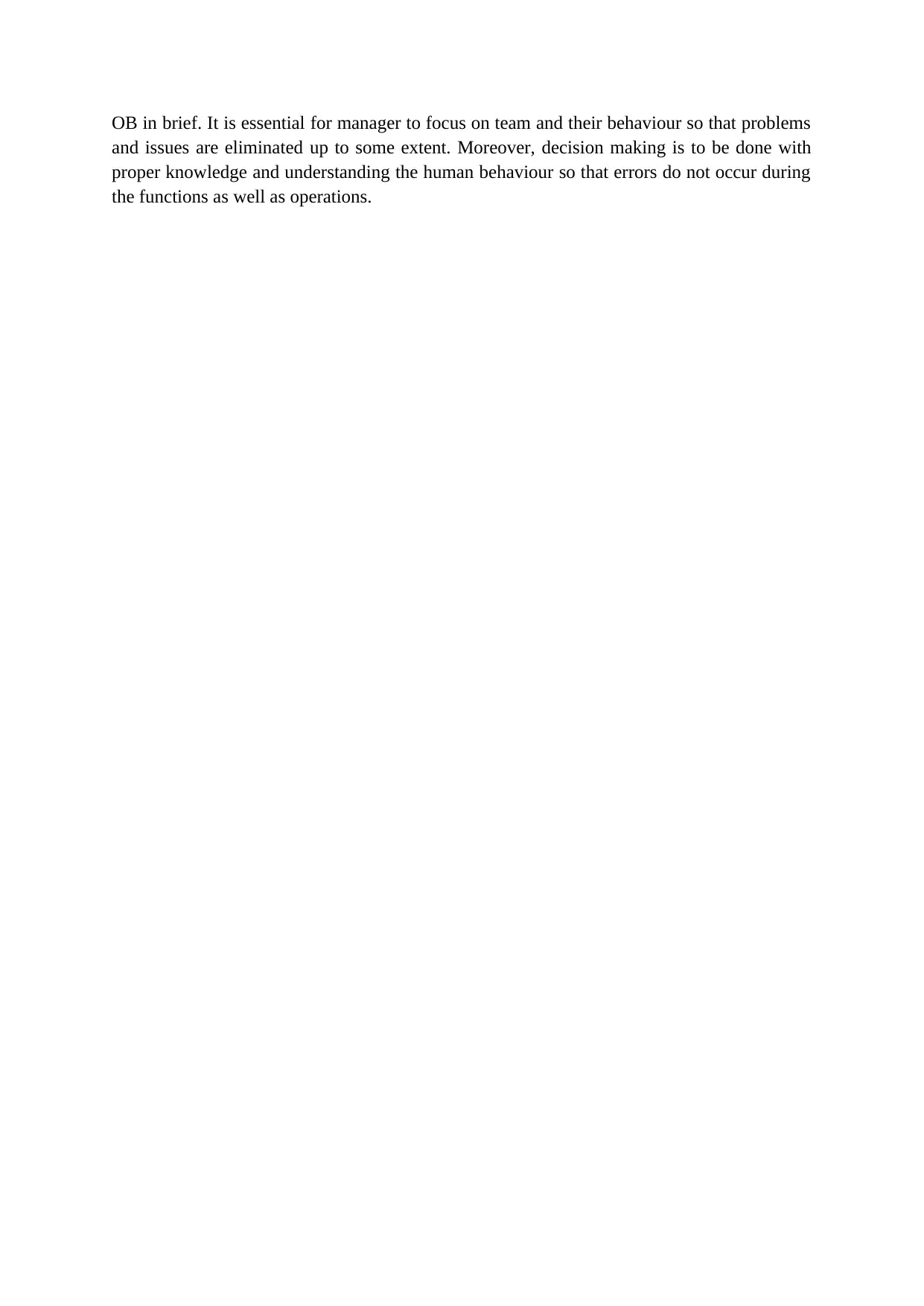
OB in brief. It is essential for manager to focus on team and their behaviour so that problems
and issues are eliminated up to some extent. Moreover, decision making is to be done with
proper knowledge and understanding the human behaviour so that errors do not occur during
the functions as well as operations.
and issues are eliminated up to some extent. Moreover, decision making is to be done with
proper knowledge and understanding the human behaviour so that errors do not occur during
the functions as well as operations.
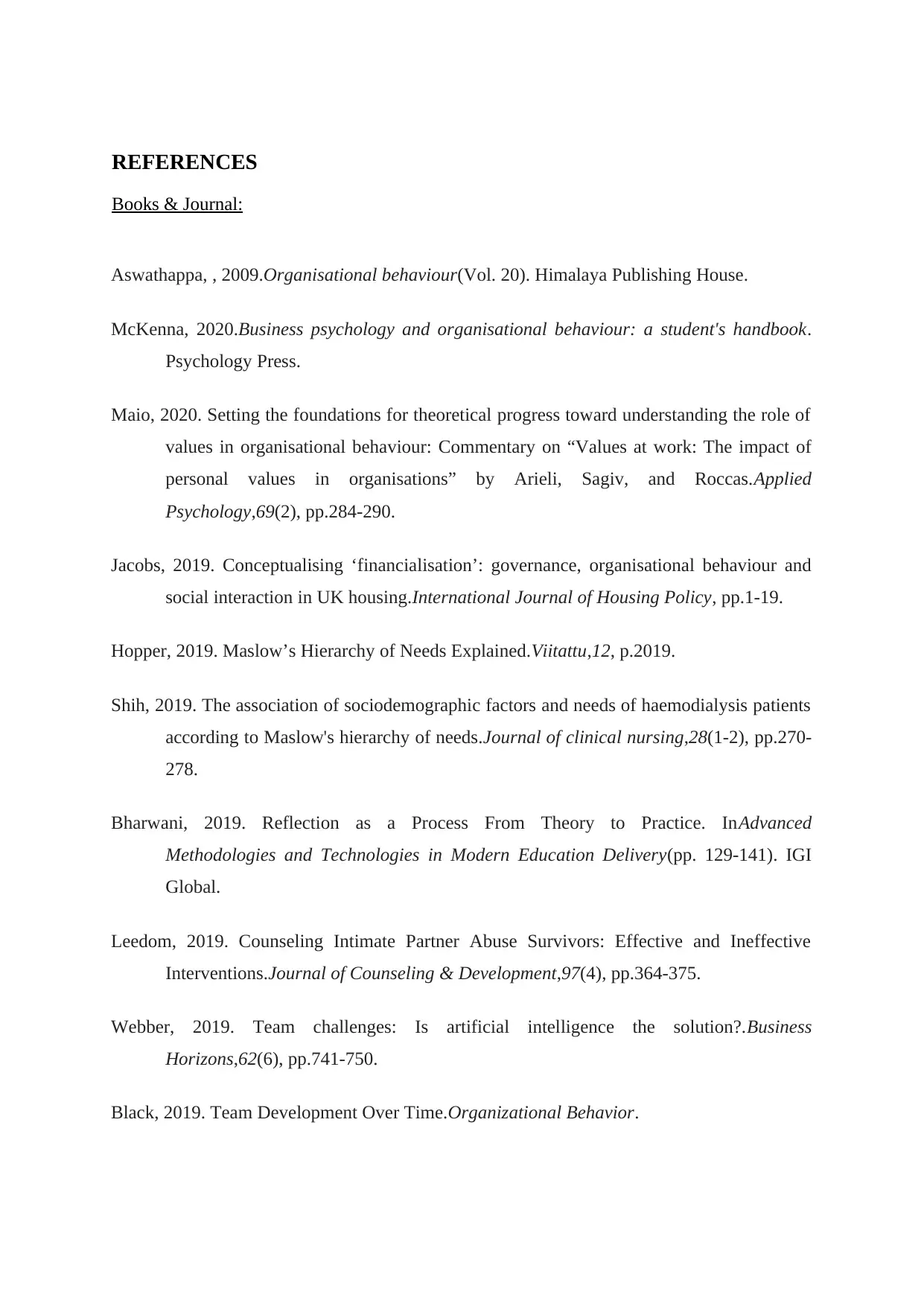
REFERENCES
Books & Journal:
Aswathappa, , 2009.Organisational behaviour(Vol. 20). Himalaya Publishing House.
McKenna, 2020.Business psychology and organisational behaviour: a student's handbook.
Psychology Press.
Maio, 2020. Setting the foundations for theoretical progress toward understanding the role of
values in organisational behaviour: Commentary on “Values at work: The impact of
personal values in organisations” by Arieli, Sagiv, and Roccas.Applied
Psychology,69(2), pp.284-290.
Jacobs, 2019. Conceptualising ‘financialisation’: governance, organisational behaviour and
social interaction in UK housing.International Journal of Housing Policy, pp.1-19.
Hopper, 2019. Maslow’s Hierarchy of Needs Explained.Viitattu,12, p.2019.
Shih, 2019. The association of sociodemographic factors and needs of haemodialysis patients
according to Maslow's hierarchy of needs.Journal of clinical nursing,28(1-2), pp.270-
278.
Bharwani, 2019. Reflection as a Process From Theory to Practice. InAdvanced
Methodologies and Technologies in Modern Education Delivery(pp. 129-141). IGI
Global.
Leedom, 2019. Counseling Intimate Partner Abuse Survivors: Effective and Ineffective
Interventions.Journal of Counseling & Development,97(4), pp.364-375.
Webber, 2019. Team challenges: Is artificial intelligence the solution?.Business
Horizons,62(6), pp.741-750.
Black, 2019. Team Development Over Time.Organizational Behavior.
Books & Journal:
Aswathappa, , 2009.Organisational behaviour(Vol. 20). Himalaya Publishing House.
McKenna, 2020.Business psychology and organisational behaviour: a student's handbook.
Psychology Press.
Maio, 2020. Setting the foundations for theoretical progress toward understanding the role of
values in organisational behaviour: Commentary on “Values at work: The impact of
personal values in organisations” by Arieli, Sagiv, and Roccas.Applied
Psychology,69(2), pp.284-290.
Jacobs, 2019. Conceptualising ‘financialisation’: governance, organisational behaviour and
social interaction in UK housing.International Journal of Housing Policy, pp.1-19.
Hopper, 2019. Maslow’s Hierarchy of Needs Explained.Viitattu,12, p.2019.
Shih, 2019. The association of sociodemographic factors and needs of haemodialysis patients
according to Maslow's hierarchy of needs.Journal of clinical nursing,28(1-2), pp.270-
278.
Bharwani, 2019. Reflection as a Process From Theory to Practice. InAdvanced
Methodologies and Technologies in Modern Education Delivery(pp. 129-141). IGI
Global.
Leedom, 2019. Counseling Intimate Partner Abuse Survivors: Effective and Ineffective
Interventions.Journal of Counseling & Development,97(4), pp.364-375.
Webber, 2019. Team challenges: Is artificial intelligence the solution?.Business
Horizons,62(6), pp.741-750.
Black, 2019. Team Development Over Time.Organizational Behavior.
⊘ This is a preview!⊘
Do you want full access?
Subscribe today to unlock all pages.

Trusted by 1+ million students worldwide
1 out of 13
Related Documents
Your All-in-One AI-Powered Toolkit for Academic Success.
+13062052269
info@desklib.com
Available 24*7 on WhatsApp / Email
![[object Object]](/_next/static/media/star-bottom.7253800d.svg)
Unlock your academic potential
Copyright © 2020–2026 A2Z Services. All Rights Reserved. Developed and managed by ZUCOL.





